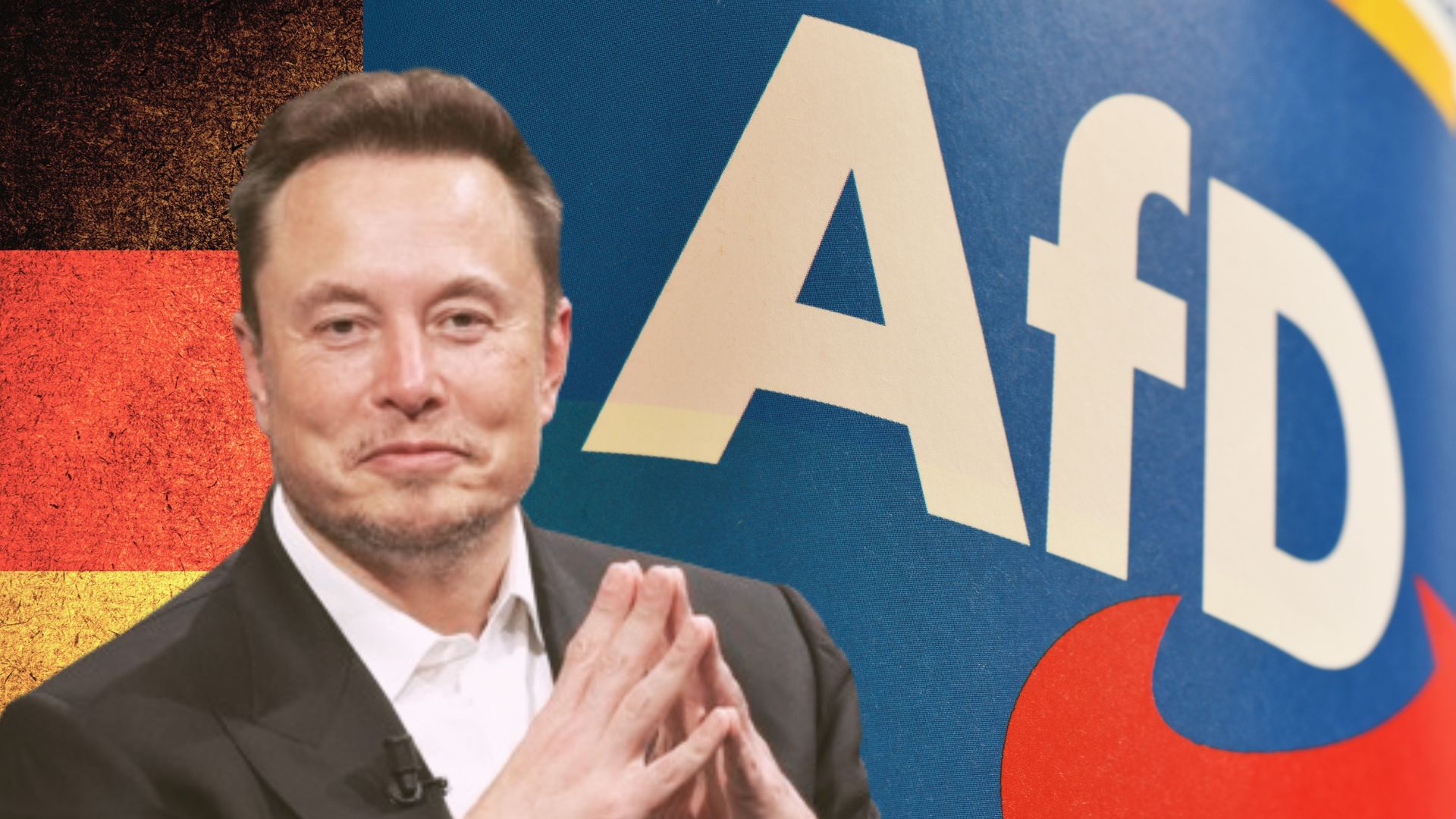Following Elon Musk’s guest column in Welt am Sontag, there is a huge outpouring of anger from the establishment parties and press over his endorsement of the Alternative for Germany (AfD) party, including claims that Musk is participating in “election interference” and harming Germany democracy. However, can Musk actually shift the election result, and if the AfD scores a surprisingly good result, how will Germany’s power elite react?
Just to get the first point out of the way, it is unlikely that Musk’s endorsement will move the needle all that much. Musk is already demonized across the EU for his takeover of X and shift towards supporting right-leaning candidates. In Germany, there is a constant stream of anti-Musk content produced on a daily basis. Musk writing an op-ed in Welt is hardly going to convince the majority of Germans, who likely already have an unfavorable opinion of Musk.
The AfD is already polling at 19 percent or so, and a poll in November set the party’s voter potential at 25 percent, which means there is a definite ceiling to the party’s support. Could Musk raise that ceiling?
My opinion piece in Weld https://t.co/J56Oof6tO4
— Elon Musk (@elonmusk) December 28, 2024As Bild writes, Hermann Binkert from the opinion research institute INSA stated that “Elon Musk’s support for the AfD can help the party with a view to the federal election. Musk enjoys sympathy in Germany… A party that covers a broader spectrum increases its voter potential.” The Bild report also notes that in “In liberal-conservative circles, the successful entrepreneur’s praise could help to normalize the AfD as a party.”
There may be some truth to this, but again, Musk’s endorsement can only go so far in Germany,. Musk also supports Donald Trump, but the vast majority of Germans still disapprove of Trump.
The outcome of the election will be made clear on Feb. 23, but if anything, the Christmas market attack in Magdeburg is more likely to shift more people towards the AfD than Musk’s opinion piece. On the high end of the scale, the AfD can expect a result in the range of 23 percent of the vote, but that would be a huge jump from where they currently stand. In all reality, the next upcoming government is likely to be CDU and the Greens or CDU and the SPD ruling once again, but a stronger AfD result could complicate any potential coalition agreement.
Reactions to Musk’s guest opinion piece
SPD General Secretary Matthias Miersch told Handelsblatt: “The fact that the Springer publishing house is even offering Elon Musk an official platform to advertise for the AfD is shameful and dangerous.” He said the process shows “how far right-wing networks have now advanced.” Now, the Bavarian SPD parliamentary group has announced it will leave X.
There is plenty of outrage all around, with Teresa Stiens of Handelblatt writing that the Welt am Sonntag allowed itself to be “harnessed to the anti-democratic cart.”
Former editor-in-chief of the ARD capital studio Ulrich Deppendorf wrote on X: “Musk’s appeal in the Welt am Sonntag is the low point in the long-standing history of the Springer publishing house.”
Konstantin von Notz, the deputy parliamentary group leader of the Greens, wrote on X: “Offering a Western oligarch like Musk a platform to promote these enemies of democracy and those who despise the rule of law is simply an amnesia.”
All of this is pretty amazing considering the actual Welt article actively attacks Musk and his AfD support — all in the same piece that Musk wrote! Has there ever been such a ridiculous “guest column” before where the author is attacked in his own piece?
Billionaires have mostly sided with the left — and that was fine
The reality is that foreign billionaires have injected themselves into elections all over the world, and while George Soros remains the classic bogeyman of the right, there are good reasons why he has earned his reputation. Not only has he funded political campaigns, NGOs, and influence operations across the world, but he has also written opinion columns — far more aggressive ones — than Musk’s own guest column.
In fact, Soros has even written for Welt, which nobody seemed to have any problem with. Soros has notably waged war against right-wing governments in a variety of op-eds, including this one targeting the Hungarian and Polish governments, and he has been doing all of this for decades. Despite all of his “election interference,” he is hailed as a hero, and more importantly a source of money, for the European establishment.
Welt stacked the deck against Musk
On top of all the brouhaha, the Welt opinion editor went so far as to resign over someone sharing their…opinion. What a sad display of virtue signaling.
“I always enjoyed heading the opinion section of WELT and WAMS. Today, an article by Elon Musk appeared in Welt am Sonntag. I handed in my resignation yesterday after it went to print,” wrote Eva Marie Kogel.
What kind of newspaper would turn down the opinion piece of one of the most influential people in the world, who owns some of the most innovative companies in the world, and who is sure to have a powerful voice in the upcoming Trump administration? If anything, Germans have a right to know what Musk is thinking, and any publication worth their salt — or with any commitment to the free flow of information — should be biting at the chomp to have him write a guest column. Germans can then decide for themselves.
Remix News, for example, would most certainly run any op-ed from George Soros, but in all fairness, we are just not big enough or influential enough to garner the attention of the billionaire class. However, the principle remains: We should hear the opinion of the people who move the world.
On top of the mass hysteria about the Musk article, it was published in a very unorthodox format. In the same piece that Musk wrote, the anti-Musk opinion is printed right below his. Normally, a pro and contra opinion piece features two different opinions on the same topic, but both writers normally do not have access to the other person’s writing sample. The reason why is obvious: It disadvantages one writer’s opinion, allowing the response to cite the original arguments and attempt to refute them while the original poster has no chance to respond in the same piece.
Basically, Welt rigged the whole process, first by not allowing Musk’s piece to stand alone, as is normally the right of opinion piece writers, and second by allowing the contra writer to have access to Musk’s opinion without Musk having the right of response. Welt could have run a separate opinion piece refuting Musk’s opinion, but they did not do that. Instead, they appear to have played a dirty trick on Musk, and it is just another small example which shows the various measures the establishment will go to stack the deck against anyone opposing their narrative.
How will Germany react to a surprise election result from the AfD?
Of course, Musk and other factors may deliver a shock result for the AfD, in the range of 23 percent or above .If such a scenario were to transpire, we may truly see a “mask off” situation from the German establishment, as it could complicate the formation of a coalition government.
Far more concerning than Musk sharing his opinion — notably one that pretends to value freedom of expression — were the words of warning from German President Frank Steinmeier following Musk’s guest column.
“”I also expect the election campaign to be conducted fairly and transparently. Outside influence is a danger to democracy, whether it is covert, as was evidently the case recently in the Romanian elections, or open and blatant, as is currently being practiced particularly intensively on platform X,” said Steinmeier.
NOW – German president Steinmeier (SPD) on the upcoming election: "External influence is a danger to democracy, whether it is covert… or open and blatant, as is currently being practiced particularly intensively on the platform X." pic.twitter.com/s1miQwyzC3
— Disclose.tv (@disclosetv) December 27, 2024Steinmeier’s warning about foreign interference sounds ominous in the context of Romania. After all, he makes no mention of the Romanian government’s reaction to this alleged foreign interference, which was to cancel the entire election.
Is there anything more undemocratic than outright canceling an election? The move in Romania has set an incredibly dangerous precedent. Romania’s Constitutional Court has offered basically no solid evidence that the Russians were “influencing” the elections, and even if Moscow paid some TikTok influencers, is this now grounds to cancel an entire election?
Now, the question can be asked if such a scneario could play out in Germany. Could an entire election just be canceled? That answer is of course it could. If the German establishment was under enough pressure, any actions, no matter how extreme, would be warranted to “protect democracy.” The same establishment is already openly looking to ban the entire AfD party, so despite all their high talk, it is important to remember that the only acceptable version of democracy is one in which they are winning.
Germany’s influence operations
Despite claims that Musk is participating in “foreign election interference,” such a stance is rich coming from the German government. In what is an even more “egregious” form of interference, Chancellor Olaf Scholz publically voiced his preference for Biden over Trump. This was not an outright endorsement but about as close as Scholz could get without officially backing Biden.
So what? Scholz has his preferences, and we deserve to hear them. Musk has his preference, and we also deserve to hear his.
However, Germany’s state media arm is notoriously involved in other elections across the world, including the lavishly funded Deutsche Welle. Let’s keep in mind that Elon Musk is a private individual, whereas German state media receives €410 million in taxpayer funding every year. That figure is not a typo. We’re almost at half a billion for just the one outlet, which runs numerous operations in different languages. Of course, there is also the other state media outlets that also receive hundreds of milions, such as ZDF and ARD. These are sprawling media giants funded by many German taxpayers who clearly disagree with their editorial line.
DW is also highly partisan. DW Stories, for example, put out pieces that basically compare Donald Trump to the Nazis.
Deutsche Welle also openly called the Facebook ban of Donald Trump, a former president and current president-elect, the “right decision” in an op-ed post. There are an endless amount of stories that go directly into the realm of foreign interference, and DW generates a lot of stories and hits with their thousands of employees. Should Hungary cancel its next election due to “foreign interference” because DW runs hit pieces against Orbán, which refer to his country as a “democratically legitmized autocracy?” The thought is absurd, and we all know what the reaction from Europe would be.
The reality is whatever Germany claims about foreign interference regarding the upcoming election, there is palpable outrage against the ruling government. The Christmas market attack is only the latest manifestation of the government’s failed policies, which also date back to the CDU, which was the ruling party the last time a Christmas market was hit with an Islamic terror attack. Polling shows the AfD’s stance, on immigration for example, is more or less mainstream, which is why the CDU has been trying to co-opt much of the party’s program on immigration even if they have no real plan to follow through, especially due to their future coalition partnership with the Greens or SPD.
However, there will likely be no need to “cancel” election results just yet in Germany. The political establishment has likely been sitting on certain avenues of attack against the AfD that they will spring over the next two months, whether it is secret recordings or other damaging information. Spying on German supporters of the AfD is legal after all in many German states. It has long been an ongoing pattern that these surprises are sprung shortly before an election, all the way from the AfD Berlin offices being raided in 2022 right before state elections to the strange saga surrounding the Voice of Europe (VoE) media outlet being shut down just before the EU parliamentary elections.






